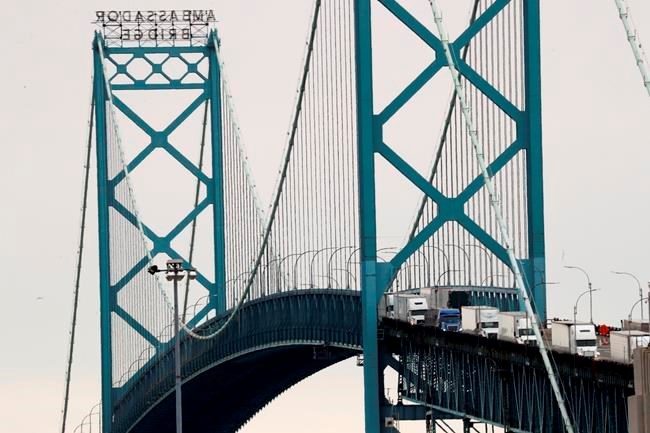The federal government's decision to drastically limit traffic across the U.S-Canada border will be well worth the economic consequences if it helps curb the spread of the COVID-19 pandemic, officials for a major Ontario border city said Wednesday.
All acknowledged that an economic cloud will likely descend on Windsor, Ont., home to the busiest crossing between the two nations and soon to be largely deserted after Wednesday's announcement of the looming closure.
The Canadian and United States governments, by mutual consent, announced the border would be barred to all non-essential traffic, with exceptions for goods flowing between the two countries and critical staff such as health-care workers.
Windsor Mayor Drew Dilkens said that while the move represents a sharp departure from the norm, it makes sense in light of the extraordinary conditions the COVID-19 outbreak has imposed around the world.
"I think folks here can put up with the short-term pain of not being able to buy groceries or ... go for dinner in Detroit over the long-term gain of making sure that they and their families are healthy and help flatten the curve on this very serious matter," Dilkens said in a telephone interview Wednesday.
Dilkens said border traffic had already slowed to a crawl in the days leading up to the federal announcement as a series of unprecedented closures took effect in both countries.
In Windsor, as in the rest of Ontario, many businesses closed their doors in a bid to promote so-called "social distancing" as the number of COVID-19 cases continued to climb. A state of emergency was declared in the province on Tuesday, and health officials said Wednesday that the number of cases linked to the novel coronavirus had passed 200.
But trucks ferrying critical goods such as food and medicine between the two countries continued to roll even as the public health situation deteriorated, and Dilkens said he's glad to see that traffic will not be disrupted by the new federal measures.
Rakesh Naidu, president of the local chamber of commerce, agreed.
He said applying the closure to trade would have been a disastrous move for a city that sees about $500 million worth of goods flow across the border each day.
The tightened international boundary will all but ensure Windsor loses out on usually reliable tourism and hospitality revenue, Naidu said, while noting that industry was already taking a significant hit before Wednesday's announcement.
Overall, he said, public health interest must come ahead of economic concerns as the outbreak runs its course.
"We saw it coming," Naidu said of the new restrictions. "It's concerning because free movement of goods and people helps the economy on both sides, but at this point of time, restricting them is necessary."
Both Dilkens and Naidu said they're waiting for further clarification on how specific groups of frequent border-crossers will be treated under the new measures.
Naidu said temporary foreign workers coming from the U.S. play a vital role in maintaining Windsor's greenhouses and growing local crops, while Dilkens raised questions about factory workers travelling from Windsor to work in automotive plants in neighbouring Detroit.
Both called on the federal government to firm up the rules for such groups as soon as possible.
Health authorities say COVID-19 could overwhelm Canada's hospitals if it spreads freely. Most people suffer relatively manageable symptoms, such as fevers and coughs, but a small percentage of people diagnosed with the novel coronavirus need intensive care, sometimes for weeks.
More than 200,000 people around the world have tested positive for the virus and 8,300 are known to have died from it.
There are now more than 600 confirmed cases of COVID-19 in Canada, including nine deaths.
This report by The Canadian Press was first published March 18, 2020.
Michelle McQuigge, The Canadian Press



